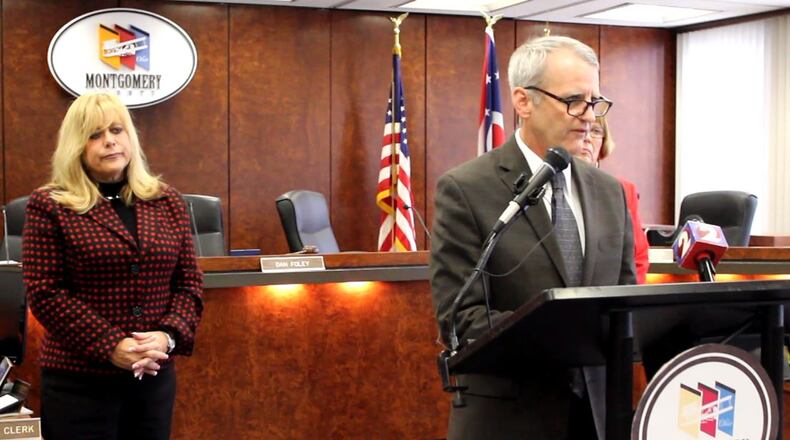“We’re right now in the middle of a transition … the Department of Justice has finite resources, and the administration may prioritize different types of cases,” said Mike Brickner, senior policy director with the ACLU of Ohio.
On Tuesday, Montgomery County commissioners announced they were sending a letter to the Civil Rights Division of the U.S. Justice Department asking for an “immediate investigation” into allegations of improper conduct and use of force against jail inmates.
The county faces seven civil lawsuits from former inmates who claim they were mistreated while incarcerated.
If the plaintiffs win their suits or the cases end in settlement, the county could be forced to make sizable payouts.
Commissioners have requested the Civil Rights Division to probe practices and activities at the county jail. The elected leaders said they felt compelled to reach out for federal assistance after they said Montgomery County Sheriff Phil Plummer was unwilling to take meaningful action to remedy issues and challenges at the facility.
Plummer called the commissioners’ request for a federal review “aggressive and politically charged.” Plummer is the head of the Montgomery County Republican Party. All three county commissioners are Democrats.
The sheriff said three of seven suits against jail operations are medical related, while four are related to use of force.
Plummer said the jail has booked in more than 127,000 people in the five years that the seven lawsuits have been filed.
The Justice Department reached settlements with the cities of Baltimore and Cleveland to make sweeping reforms to police practices to fix what investigators described as systemic abuses and unconstitutional practices.
The Civil Rights Division investigated Baltimore after the death of Freddy Gray, who was killed while in the back of a police vehicle.
Then-U.S. Attorney General Lynch launched an investigation into the Baltimore Police Department after considering requests from city officials and hearing directly from community members about a potential pattern or practice of constitutional violations.
The division investigated Cleveland following a request by the city’s Mayor Frank Jackson. The probe concluded the city’s police department engaged in a pattern or practice of using excessive force.
Last year, the department sued the city of Ferguson for allegedly failing to correct “years of systematic deficiencies” in the operation of its police department, which was thrust into the national spotlight after an officer shot and killed 18-year-old Michael Brown.
The Civil Rights of Institutionalized Persons Act of 1980 gives the attorney general the authority to investigate conditions at state and local jails.
The Special Litigation Section of the Justice Department works with some of the best correctional experts in the nation on its investigations, which can take six months or more than a year to complete and usually includes on-site visits, document reviews and interviews with facility staff and inmates, said Sheila Bedi, a clinical associate professor of law at the Northwestern Pritzker School of Law in Chicago.
Investigators then issue a letter of findings that spell out any violations of law that were discovered, Bedi said.
In most cases, the Civil Rights Division will try to negotiate a settlement or provide technical assistance to a jail or jurisdiction where a pattern or practice of unlawful activities are discovered.
These consent decrees are agreed upon orders that are approved by the courts that require monitoring to gauge the progress being made to fix problems and improve conditions.
However, the division on occasion has filed lawsuits if an agreement cannot be reached or does not lead to reforms.
The Justice Department’s use of consent decrees has eliminated serious issues at some jails across the nation, Bedi said.
“Under the right circumstances — with the right lawyers on the case, and with the right ability to enforce a good consent decree — they can make a tremendous difference,” she said.
But the Justice Department’s enforcement priorities and actions could change under Trump, Bedi said.
Attorney General Jeff Sessions, who was confirmed Wednesday, has expressed concerns about using consent decrees to address law enforcement issues.
During his confirmation hearing, Sessions said, “I think there is concern that good police officers and good departments can be sued by the Department of Justice when you just have individuals within a department that have done wrong.”
But multiple lawsuits and complaints made against the jail alleging excessive use of force, race discrimination and other problems should compel the Justice Department to take a closer look at its operations, said Brickner, with the ACLU.
About the Author

